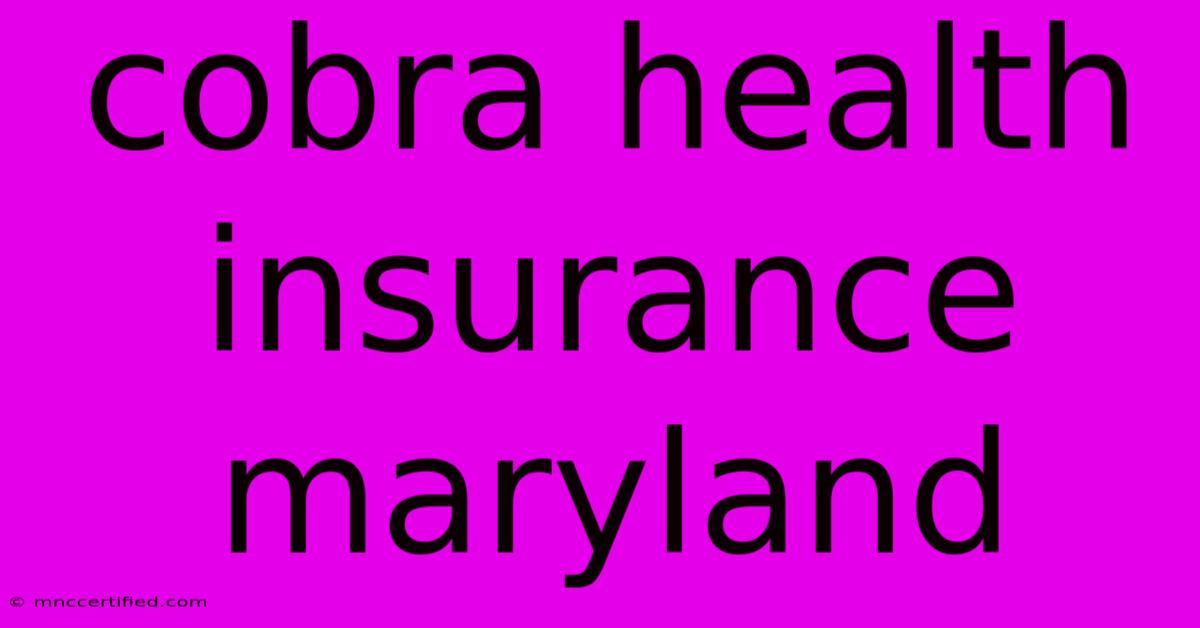Cobra Health Insurance Maryland

Table of Contents
Cobra Health Insurance Maryland: Your Guide to Continued Coverage
Losing your employer-sponsored health insurance can be stressful, especially in a state like Maryland with its unique healthcare landscape. Fortunately, the Consolidated Omnibus Budget Reconciliation Act (COBRA) offers a lifeline, allowing you to continue your coverage for a limited time. This comprehensive guide will walk you through everything you need to know about COBRA health insurance in Maryland.
Understanding COBRA in Maryland
COBRA is a federal law mandating that most employers with 20 or more employees offer their employees and their dependents the option to continue their group health insurance coverage for a specific period after a qualifying event. While the federal law sets the foundation, Maryland's specific regulations and insurance market may influence your experience.
Qualifying Events for COBRA in Maryland
Several events trigger your COBRA eligibility. These include:
- Job loss (involuntary termination): This is the most common reason. However, if you quit voluntarily, you generally won't qualify.
- Reduction in work hours: If your hours are reduced to the point where you are no longer eligible for employer-sponsored insurance.
- Death of the employee: Dependents can typically continue coverage.
- Divorce or legal separation: If coverage was dependent upon your marital status.
- Loss of dependent status: For children who age out of dependent coverage or are no longer financially dependent.
It's crucial to understand that not all events qualify. Carefully review your employer's COBRA notification to ensure your situation meets the criteria.
How Long Does COBRA Coverage Last in Maryland?
Under federal COBRA law, you generally have up to 18 months of continued coverage. However, there are exceptions:
- 18 months for most qualifying events: This is the standard duration for job loss, reduction in hours, and other qualifying events.
- 36 months for disability: If you become disabled during the 18-month period, you may be eligible for an additional 18 months of coverage, totaling 36 months.
- 29 months for dependent loss of coverage: If the qualifying event was related to a dependent losing coverage.
Finding COBRA Information in Maryland
Your primary source of information is your former employer. They are legally obligated to provide you with a COBRA notice explaining your rights and options. This notice should detail:
- Your COBRA eligibility: Clearly stating whether you qualify.
- Your COBRA premium: The cost of continued coverage, which is typically higher than when you were actively employed. This will usually include the employer's previous contribution and your portion.
- Your election period: The timeframe you have to decide whether or not to elect COBRA coverage. This is typically 60 days from the date of the qualifying event.
- Your payment deadline: The date by which you must pay your first premium.
- Contact information: Details on who to contact with questions.
If you have difficulty obtaining this information, contacting the Maryland Insurance Administration might be helpful. They can provide general guidance on COBRA and insurance regulations within the state.
Choosing between COBRA and Other Options in Maryland
COBRA is not always the best option. Consider these alternatives:
- Spouse's employer-sponsored health insurance: If your spouse has health insurance through their employer, this may be a more affordable option.
- Marketplace coverage (Maryland Health Connection): Maryland offers a health insurance marketplace where you can find plans that may be less expensive than COBRA. You can explore plans during open enrollment periods or during special enrollment periods if you experience a qualifying life event.
- Medicaid: If you meet the income requirements, you may qualify for Medicaid.
The Cost of COBRA in Maryland
The cost of COBRA coverage can be significantly higher than when you were employed because you're now responsible for the full premium, including the portion your employer previously covered. Carefully evaluate the cost versus other insurance options available in Maryland before making a decision.
Key Takeaways: Navigating COBRA in Maryland
Understanding COBRA in Maryland requires careful attention to detail. Remember to:
- Review your COBRA notification thoroughly: Ensure you understand your rights and responsibilities.
- Act quickly: You have a limited time to elect COBRA coverage.
- Compare your options: Don't automatically assume COBRA is your best choice. Explore marketplace plans and other alternatives.
- Contact your former employer or the Maryland Insurance Administration if you have questions: They are resources to help you navigate this process.
By understanding your rights and available options, you can navigate the complexities of COBRA and secure the healthcare coverage you need in Maryland.

Thank you for visiting our website wich cover about Cobra Health Insurance Maryland. We hope the information provided has been useful to you. Feel free to contact us if you have any questions or need further assistance. See you next time and dont miss to bookmark.
Featured Posts
-
Mustangs In Acc Championship Game
Nov 24, 2024
-
Pl Cup Quarters U18s Win Through
Nov 24, 2024
-
Arteta Warns Arsenal Stars After Lineup Changes
Nov 24, 2024
-
Storm Bert Worst Yet To Come
Nov 24, 2024
-
Week X Iowa Football Photos Vs Maryland
Nov 24, 2024